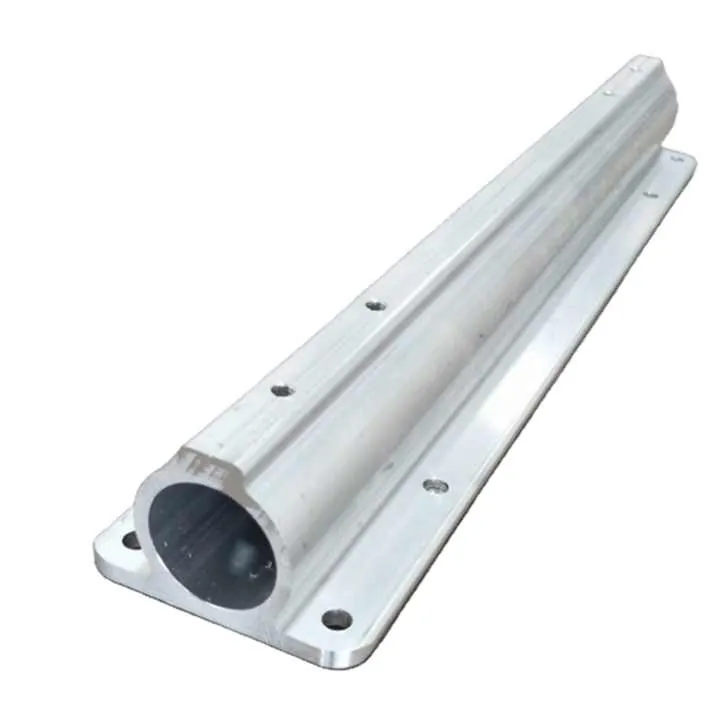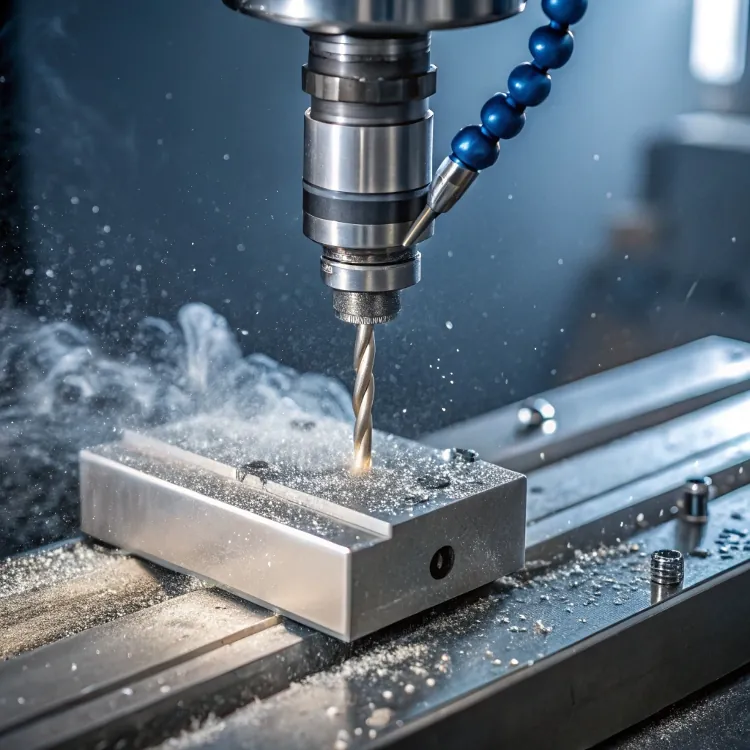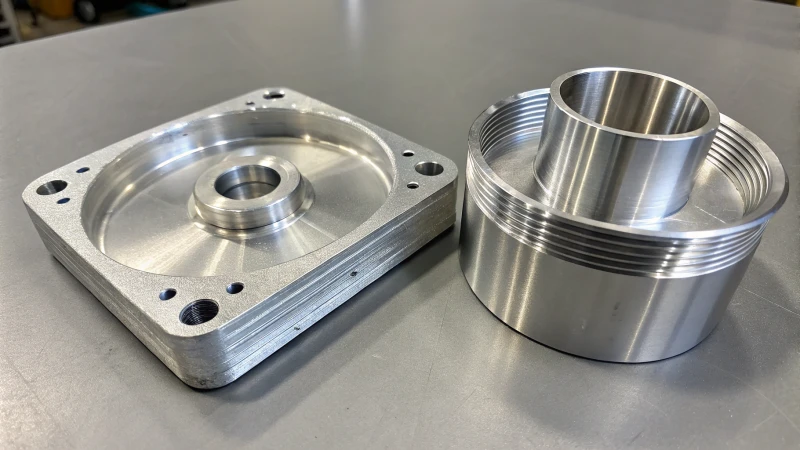CNC Machining Usa : Guide des fabricants et de l'industrie

Partie 1 : Taille et croissance du marché
L'usinage CNC aux États-Unis est devenu l'un des piliers les plus importants de la fabrication moderne. L'industrie soutient les secteurs de l'aérospatiale, de l'automobile, des appareils médicaux et de l'électronique grand public. L'automatisation et la précision sont les principaux moteurspermettant aux usines de produire des pièces complexes à grande vitesse. J'ai vu comment cette technologie a transformé de petits ateliers en fournisseurs mondiaux hautement compétitifs.

Le marché américain de l'usinage CNC est évalué à plusieurs milliards de dollars, avec une croissance régulière due à la demande de pièces personnalisées et de prototypage rapide. Les entreprises de différents secteurs font appel à l'usinage CNC pour la production de masse et les conceptions spécialisées. La technologie n'est plus limitée aux grandes usinesMême les start-ups et les laboratoires de recherche l'utilisent pour tester de nouveaux produits.
Les politiques, les investissements et les groupements industriels jouent également un rôle important. Les mesures d'incitation du gouvernement américain en faveur de la fabrication avancée encouragent les entreprises à adopter des solutions CNC. Dans le même temps, des pôles régionaux comme le Midwest et la Californie créent de solides réseaux de fournisseurs. Ces regroupements permettent aux petites et moyennes entreprises de développer plus facilement leurs activités et d'être compétitives à l'échelle mondiale.
Partie 2 : Entreprises leaders
Haas Automation
Haas Automation, fondée en 1983 en Californie, est l'un des plus grands constructeurs de machines-outils d'Amérique. Elle est réputée pour ses machines CNC fiables et abordables. La société a commencé avec des centres d'usinage verticaux et s'est étendue à une large gamme d'équipements.

Les machines Haas sont largement utilisées dans les secteurs de l'aérospatiale, de l'automobile et de la métallurgie. Elles sont appréciées parce qu'elles allient performance et convivialité des commandes. De nombreux petits ateliers aux États-Unis font appel à Haas pour les tâches d'usinage quotidiennes. Haas investit également dans l'éducation en soutenant des programmes de formation.
L'entreprise a été reconnue au niveau mondial pour son innovation et son solide service après-vente. Ses certifications garantissent que ses machines répondent aux normes internationales de sécurité et de qualité.
Okuma America Corporation
Okuma America, fondée en 1898 au Japon et qui s'est ensuite développée aux États-Unis, est un acteur majeur de l'usinage CNC. Son siège américain se trouve à Charlotte, en Caroline du Nord. Okuma se concentre sur les solutions d'usinage de haute précision et les logiciels de contrôle avancés.

Okuma propose des tours CNC, des machines multitâches et des centres d'usinage. La société est connue pour son système de contrôle OSP, qui intègre le logiciel et le matériel pour une meilleure efficacité. De nombreuses entreprises des secteurs de l'aérospatiale et de l'énergie choisissent Okuma pour leurs composants critiques.
Okuma a reçu de nombreuses récompenses pour son innovation et sa durabilité. Ses produits répondent à des certifications mondiales, notamment aux normes ISO. L'entreprise s'associe également à des universités pour promouvoir la recherche dans le domaine des technologies de fabrication.
Mazak Corporation USA
Mazak, entreprise d'origine japonaise, est fortement implantée aux États-Unis depuis 1974. L'entreprise exploite un vaste campus de fabrication à Florence, dans le Kentucky. Mazak est reconnue pour sa technologie CNC avancée et son innovation permanente.

Mazak est spécialisée dans les machines multitâches, la fabrication hybride avec des processus additifs et soustractifs, et les solutions d'automatisation. Les entreprises de matériel médical et les entreprises de défense s'appuient sur les machines Mazak pour les projets critiques.
Mazak est certifiée dans de multiples normes de qualité mondiales et mène souvent des foires industrielles avec ses dernières technologies. Elle investit également dans des solutions d'usine intelligente pour soutenir l'adoption de l'industrie 4.0 aux États-Unis.
| Entreprise | Fondée | Produits de base | Industries | Certifications |
|---|---|---|---|---|
| Haas Automation | 1983, ÉTATS-UNIS | Centres d'usinage CNC, tours | Automobile, aérospatiale, éducation | ISO, CE |
| Okuma America | 1898 (Japon), siège des États-Unis en Caroline du Nord | Tours CNC, centres d'usinage | Aérospatiale, énergie, médecine | ISO, Prix de l'industrie |
| Mazak USA | 1974 (présence aux États-Unis) | Machines CNC multitâches | Défense, médical, automobile | ISO, CE |
Partie 3 : Salons professionnels et événements industriels
IMTS (Salon international des technologies de fabrication)
L'IMTS est l'un des plus grands salons professionnels de l'industrie manufacturière en Amérique du Nord. Il a lieu tous les deux ans à Chicago et attire des milliers d'exposants et de visiteurs. Le salon couvre l'usinage CNC, l'automatisation, la robotique et la fabrication numérique.

L'événement comprend des démonstrations de machines en direct, des lancements de nouveaux produits et des opportunités de réseautage. C'est le meilleur endroit pour les fabricants de voir les dernières technologies CNC en action.
WESTEC
Le WESTEC est un événement majeur de l'industrie manufacturière qui se tient en Californie. Il rassemble des entreprises des secteurs de l'aérospatiale, de la médecine et de la haute technologie. Le salon est axé sur l'usinage CNC, l'impression 3D et les solutions d'usine intelligente.

Les visiteurs peuvent participer à des séminaires techniques, assister à des démonstrations et rencontrer des fournisseurs. De nombreuses start-ups utilisent WESTEC pour présenter des outils et des méthodes d'usinage innovants. Cet événement constitue un lien solide entre les industries de la côte ouest et les fournisseurs mondiaux.
| Événement | Date | Localisation | Points forts |
|---|---|---|---|
| IMTS | Tous les 2 ans | Chicago, IL | Démonstrations en direct, exposants internationaux, lancements de produits |
| WESTEC | Annuel | Californie | CNC, impression 3D, solutions d'usine intelligente |
Partie 4 : Impact des politiques commerciales mondiales
Les politiques commerciales mondiales ont un impact direct sur l'usinage CNC aux États-Unis. Les droits de douane sur l'acier et l'aluminium affectent le coût des matières premières. Les sanctions et les tensions commerciales peuvent limiter l'approvisionnement en composants essentiels. De nombreux fabricants américains doivent faire face à des coûts plus élevés en raison de ces changements au niveau mondial.

Dans le même temps, les politiques créent également des opportunités pour les fournisseurs locaux. La promotion de la fabrication nationale réduit la dépendance à l'égard des importations. Cette tendance encourage les investissements dans les ateliers d'usinage américains et dans les technologies CNC de pointe. La résilience de la chaîne d'approvisionnement est désormais une priorité pour de nombreuses entreprises.
La concurrence mondiale façonne également le secteur. Les fabricants américains doivent s'adapter pour rivaliser avec l'Asie et l'Europe. Les accords commerciaux, les restrictions à l'exportation et les nouveaux partenariats influencent tous le lieu et la manière dont les entreprises se développent. Certaines entreprises y voient une chance d'innover et de progresser dans la chaîne de valeur.
Partie 5 : Conclusion
L'industrie de l'usinage CNC aux États-Unis offre d'énormes possibilités. Les secteurs de l'aérospatiale, de la médecine et de l'automobile continuent d'exiger des pièces de haute précision. Grâce à l'automatisation et aux usines intelligentes, les entreprises américaines sont bien placées pour croître. Les salons professionnels et les groupements d'entreprises maintiennent l'innovation en vie et aident les petites entreprises à se développer.
Cependant, l'industrie est également confrontée à des risques. Les politiques commerciales, les coûts des matériaux et la concurrence mondiale créent des incertitudes. Les entreprises doivent trouver un équilibre entre l'innovation et la résilience pour rester compétitives. En s'adaptant aux nouvelles technologies et en se concentrant sur la sécurité de la chaîne d'approvisionnement, le secteur américain de l'usinage CNC peut continuer à se renforcer dans les années à venir.



